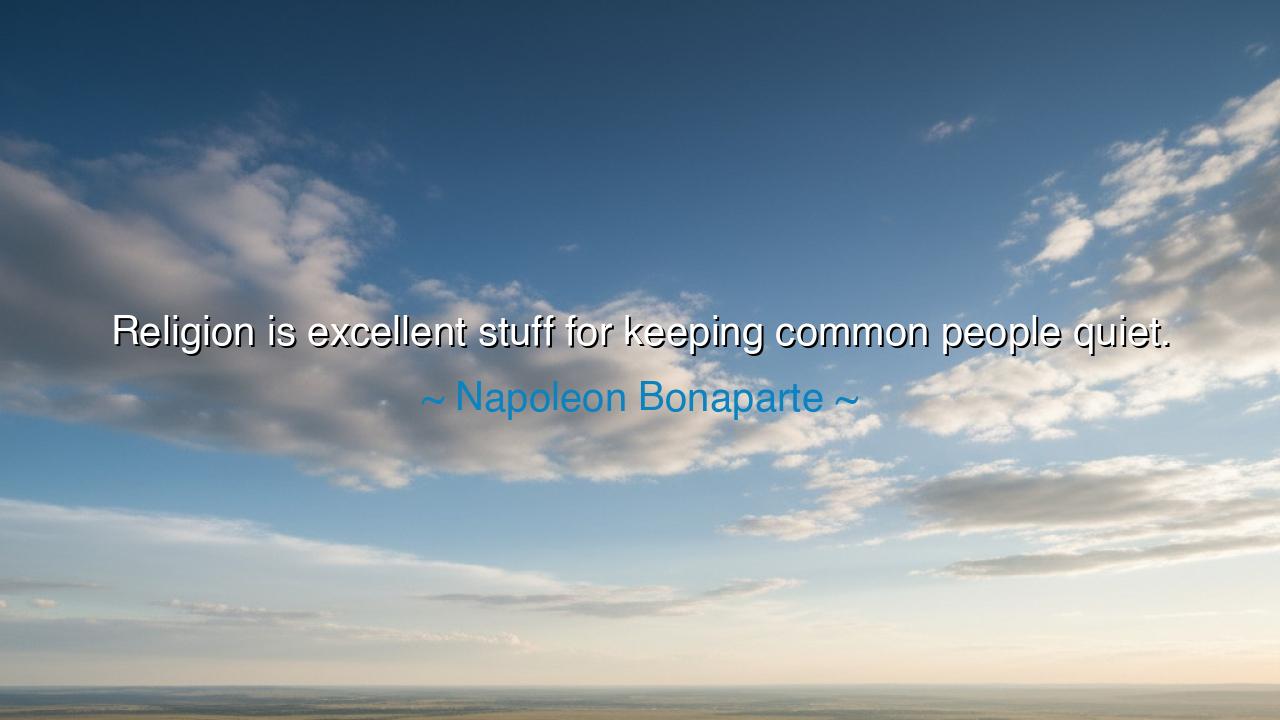
Religion is excellent stuff for keeping common people quiet.






In the annals of history, few figures have wielded power with as much determination and ambition as Napoleon Bonaparte. The French general and emperor, known for his military conquests and profound influence on Europe, once made a pointed remark that resonates deeply: "Religion is excellent stuff for keeping common people quiet." These words, while controversial, speak to the complex relationship between religion and power. In this statement, Napoleon critiques the way religion can sometimes be used as a tool of control, particularly over those who are vulnerable or lacking in political power. Religion, he suggests, has the potential to pacify the masses, offering them hope and solace, thereby preventing them from challenging the existing order.
To understand Napoleon’s view, we must look to the ancient and medieval past, where religion often played a central role in political life. In ancient Mesopotamia, Egypt, and Greece, the gods were not just objects of devotion—they were integral to the legitimacy of kings and rulers. The Pharaohs of Egypt were not only political leaders but also considered divine beings. This divine right to rule was bolstered by religion, as the people were taught that their fate was in the hands of the gods. The great empires of the ancient world used religion as a tool to maintain order and to prevent rebellion, reminding their subjects that defying the ruler was akin to defying the divine order. This use of religion to control the masses is not just ancient history—it persists through the ages, finding its way into Napoleon’s world as he navigated the turbulence of revolution and the consolidation of power.
In Napoleon’s own time, during the French Revolution, religion was in turmoil. The revolutionaries sought to break away from the traditional power structures of the Catholic Church and monarchy, which had long been intertwined. In the wake of this revolutionary upheaval, Napoleon sought to stabilize his regime by reintegrating religion into French society in a way that was useful to his power. His Concordat of 1801 with the Pope was a clear example of how religion could be used as a means of both legitimizing and controlling authority. Napoleon recognized that by reconciling with the church, he could ensure the loyalty of the common people, who still looked to religion for guidance and comfort. This strategic use of religion allowed him to cement his rule, providing him with the support of the masses while maintaining his own absolute power.
The idea that religion can pacify and control the masses has been echoed throughout history. Karl Marx, the great revolutionary thinker, famously referred to religion as the "opiate of the people"—suggesting that it serves as a sedative, dulling the senses of the oppressed and preventing them from recognizing their true power. This perspective aligns with Napoleon's view, as both saw religion as a tool to keep people submissive and prevent the revolutionary spirit from rising up against the powerful. The priesthood, in this sense, becomes not just a spiritual guide, but a political ally, working to ensure that the masses remain obedient to the rulers, not because of divine will, but because of the teachings and structures that were put in place by those in power.
However, Napoleon’s view, while critical, is not without its wisdom. It underscores the complexity of religion—a force that can both uplift and oppress, provide solace and silence. Religion, at its best, has the power to inspire individuals to live by principles of compassion, justice, and self-sacrifice. Christ taught the world to love thy neighbor, to forgive and heal. Buddha called for mindfulness and inner peace, while Muhammad emphasized mercy and unity. Yet, Napoleon’s words remind us that when religion is manipulated by those in power, it can become a tool of subjugation, used to distract from the real struggles of the world.
The lesson in Napoleon’s statement is a call to awareness: while religion can provide profound comfort and a path to meaning, we must recognize its potential to be used as a means of control. Spirituality should never be wielded as a weapon to silence the voices of the oppressed or to keep the masses from seeking their freedom. In our own lives, we must be vigilant against any attempt to use religion—or any other ideology—as a tool of oppression. Instead, we should strive to align our faith with the pursuit of truth, justice, and freedom, allowing it to uplift and empower, rather than to suppress.
In the end, Napoleon's words urge us to ask: What is the true role of religion in our lives and societies? Is it a means of personal growth and collective harmony, or has it been reduced to a tool of control? In a world where power structures are often rooted in the manipulation of belief systems, it is our duty to cultivate a faith that liberates rather than subjugates, that encourages the pursuit of justice and truth rather than maintaining the status quo. By recognizing the potential dangers of religious manipulation, we can strive for a world where spirituality is truly a force for good—empowering, enlightening, and freeing all who encounter it.






AAdministratorAdministrator
Welcome, honored guests. Please leave a comment, we will respond soon